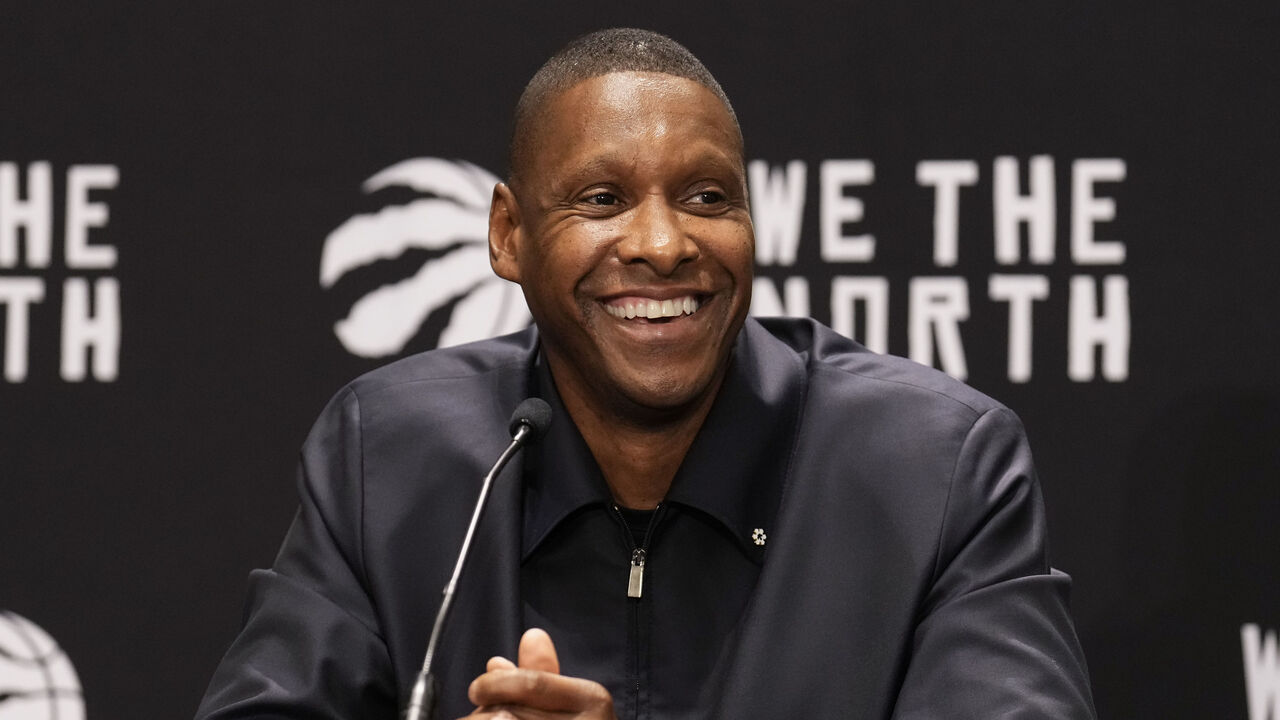Ujiri fulfills a promise with Barnes, Quickley deals
When the Toronto Raptors announced giant new contracts for Scottie Barnes and Immanuel Quickley this week, one element of the event passed unnoticed.
Masai Ujiri, belatedly, had kept a promise.
"The era of players not wanting to come here is over," he declared on the eve of the 2018-19 season. It was part of the team president's feisty answer to a question about Kawhi Leonard's pending free agency, and it included a slight admonishment to the Toronto fan base: "Believe in yourself."
Leonard left, of course, but even as he did, there was evidence that Toronto's status in the NBA had changed. He didn't bolt for Los Angeles as soon as free agency opened and, if comments from Paul George on his podcast last week are to be believed, might have partnered with his friend on the Raptors if the Clippers hadn't offered Oklahoma City so many assets in the George trade.
The Barnes and Quickley deals, though, provide more convincing proof that Ujiri has been successful in his bid to transform Toronto from the cold NBA outpost with poor cable-television choices that Americans were anxious to leave.
That reputation was well-earned. Tracy McGrady, Vince Carter, and Chris Bosh had been the three best players in Raptors history, and they all left, although the circumstances were different for each. Other players like Alonzo Mourning and Kenny Anderson refused to even come to Toronto.
DeMar DeRozan stayed, but there hadn't been a sense that other teams were lining up to sign him. Then the All-Star Game came to Toronto in 2016 in the middle of a brutal cold snap that couldn't have been a worse recruiting tool. When Leonard left, a clear pattern was emerging in which the NBA's biggest names found their way to Los Angeles, San Francisco, New York, or Miami. Would Toronto go back to being a staging point for NBA stars?
Barnes and Quickley might have seen it that way. Quickley came to the Raptors last season from the Knicks, so he already knows what it's like to play in one of the league's glamour markets. And Barnes, with Rookie of the Year and NBA All-Star already on his resume, could have run out the clock on his contract and waited to see which contender wanted to offer him the most money. Instead, they each signed five-year deals, reportedly worth a combined $387 million, to remain Raptors.
The money is huge, and long-term deals are no guarantee that a player will actually remain with a team, as recent history shows. But it shouldn't be overlooked that Barnes and Quickley signed up for a good chunk of their NBA primes in Toronto. Not so long ago, players and their agents were trying to figure out how to get back to the U.S. as soon as they arrived in Canada, if not before.

Whether those contracts end up being good business for the Raptors is another question entirely. The most important factor, obviously, will be how the players perform. The more complicated part will be how the NBA functions under its new collective bargaining agreement, with a luxury-tax line and two salary-cap aprons that impose increasing restrictions on teams that exceed them.
The impact has been significant already, with second-apron concerns cited in George's departure from the Clippers, Klay Thompson's move from Golden State to Dallas, and even Kentavious Caldwell-Pope leaving the title core of the Denver Nuggets.
There's already been some speculation that the Raptors are setting themselves up for a salary crunch by committing so much - a combined $80 million by 2027-28 - so early to two players who remain high-upside bets. But it's also impossible to know what the NBA landscape will look like a few years into the apron world, especially as the massive influx of new TV money causes salaries to balloon in future seasons.
Will established stars become more available as teams are forced to move players that they would have preferred to keep? Will roster cores that were assembled the old-fashioned way - through the draft and trades - need to be broken up anyway as their best players reach their max-contract years? (Looking at you, Thunder.) That's probably not what the CBA rules intended, but these things have a habit of working out differently in practice than in theory. The last CBA tried to encourage stars to stay with the teams that drafted them, but many of the league's biggest names still switched franchises (some of them more than once).
Ujiri and general manager Bobby Webster could be able to exploit another team's unforeseen consequences within a couple of seasons. Put another way, the roster they appear to be building today could look quite different by the time those Barnes and Quickley salaries start getting really unwieldy.
That's a question for the future, though. For now, the Raptors have convinced their guys to stay in Toronto. No wonder Ujiri was smiling.
Scott Stinson is a contributing writer for theScore.